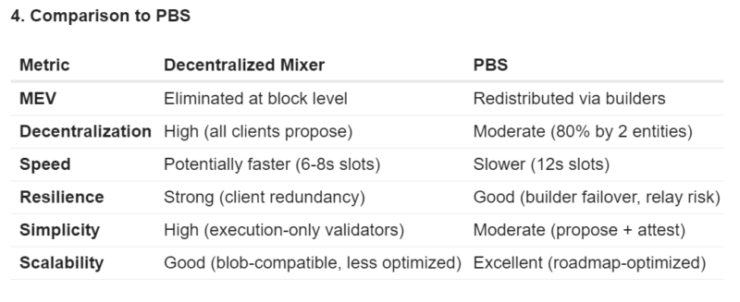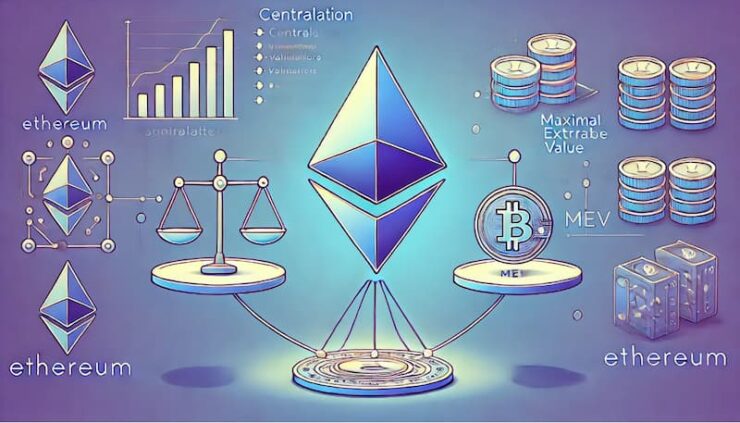Ethereum’s block-building process is more centralized than ever, but a new proposal could change that. The proposed “Decentralized Random Block Proposal” could radically shift Ethereum’s transaction processing, making it fairer and more decentralized.
Ethereum’s proposer-builder separation (PBS) was designed to reduce MEV concentration by separating block construction from block proposal. However, instead of decentralizing the process, PBS has led to a new form of centralization, where a few dominant block builders control the vast majority of blocks.
According to Ethereum Foundation researcher Toni Wahrstätter, in October 2024, two block builders, Beaverbuild and Titan Builder, were responsible for 88.7% of all Ethereum blocks. While that figure has since dropped to around 80%, Ethereum’s block-building process remains far from the decentralized ideal.
Ethereum researcher Malik672 argues that this level of centralization undermines Ethereum’s ethos and introduces security risks, stating:
“This system flips that: block-building spreads to thousands of clients globally, fully democratizing the process. No single entity dominates unlike PBS’s builder pool or a centralized mixer and Byzantine Fault Tolerance (BFT) mitigates mempool variance, ensuring robustness.”

How the ‘Decentralized Random Block Proposal’ Works
Malik672’s proposed Decentralized Random Block Proposal introduces a shared random algorithm to Ethereum’s block proposal process, leveraging Byzantine Fault Tolerance (BFT) to:
- Eliminate centralized control over block building.
- Prevent MEV-driven manipulation like front-running and arbitrage.
- Improve block propagation efficiency, potentially reducing slot times from 12 seconds to 6-8 seconds.
Under the new model, Ethereum clients rather than a handful of dominant builders—would randomly construct blocks, removing the ability for entities to game the system for profit.
A Step Toward a Fairer Ethereum
MEV, or Maximal Extractable Value, refers to the extra profit block proposers can make by reordering, inserting, or censoring transactions. This has led to exploitative practices like:
- Front-running – Bots detect large pending trades and place their own trades first to profit off price movements.
- Arbitrage – MEV searchers extract profits from price differences across decentralized exchanges.
- Censorship – Some builders prioritize certain transactions while excluding others.
Malik672 argues that Ethereum’s current model incentivizes MEV extraction, which comes at the expense of ordinary users, stating:
“This undermines Ethereum’s decentralized ethos.”
By randomly distributing block proposal rights, the proposal ensures that no single entity can control transaction ordering—making MEV nearly impossible to exploit.
Aligning with Ethereum’s Future Scaling Plans
Beyond decentralization, the proposal is compatible with Ethereum’s roadmap, including:
- Danksharding – The Ethereum scaling solution that allows Layer 2s to efficiently post data to Ethereum via “blobs.”
- Faster slot times – Reducing block times from 12 seconds to 6-8 seconds, improving Ethereum’s transaction throughput.
Ethereum researchers have already agreed to accelerate upgrade deployments in 2025, making this proposal a timely solution to pressing network challenges.
The Path to a Decentralized Ethereum
With Ethereum developers prioritizing faster upgrades, Malik672’s Decentralized Random Block Proposal could gain traction as a long-term fix for MEV and centralization.
However, the proposal would require:
- Extensive testing and community debate to assess its feasibility.
- Integration into Ethereum’s roadmap, potentially alongside future hard forks.
- Support from Ethereum validators and researchers to move forward.
Final Takeaway
Ethereum’s MEV and block centralization issues have long been a pain point, but this latest proposal suggests a path toward true decentralization. If implemented, the Decentralized Random Block Proposal could make Ethereum more resilient, fair, and efficient, eliminating MEV abuses while improving transaction speeds.
As Ethereum races toward faster upgrades, this proposal could be the key to decentralization if developers are willing to leap.





